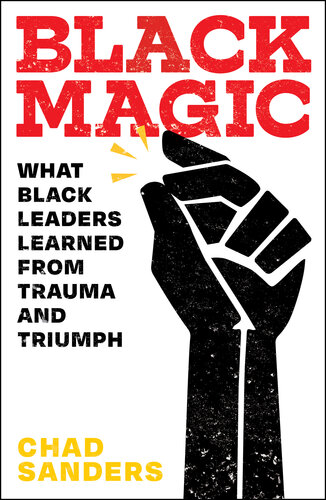
Black Magic
What Black Leaders Learned from Trauma and Triumph
کتاب های مرتبط
- اطلاعات
- نقد و بررسی
- دیدگاه کاربران
نقد و بررسی

December 14, 2020
Screenwriter Sanders debuts with a series of candid and informative interviews with Black professionals, exploring how they achieved success. A former Google employee, Sanders recalls trying to “emulate whiteness,” before discovering that his job performance improved when he stopped pretending to be someone else. He posits that the “Black experience... provides a set of skills and tactics that can lead to victories in business, art, and science,” a theory borne out in these conversations. Ed Bailey, a sports agent and Silicon Valley executive coach, speaks to the importance of stepping out of one’s comfort zone when it comes to working in unfamiliar environments. Dr. Lynn McKinley-Grant, a Harvard-educated dermatologist, provides insight on maintaining confidence in the face of white privilege, while Jewel Burks Solomon recalls being told she needed a “non-Black person” to join her start-up company before venture capitalists would invest in it. Teacher and civil rights activist DeRay Mckesson explains how educators can make course material more relevant for nonwhite students. Though the tech industry is more heavily represented than other fields, Sanders explores a broad range of issues related to the Black experience. This inspirational account offers useful lessons on how “power can be derived from trauma and suffering.”

December 15, 2020
Once Sanders stopped downplaying his true self and his Blackness, and started embracing the skills he'd learned navigating the U.S. as a Black man, his tech career in Silicon Valley grew wings. Drawing on his own experiences at Google and those of the Black leaders, scientists, artists, business people, parents, innovators, and champions he interviewed, he investigates how being a Black person in predominantly white spaces creates what he calls Black Magic: resilience, creativity, and perseverance. This mix of memoir, interviews, and motivation is for readers who have faced trauma and kept going and for individuals who have been underestimated because of their race, family, socioeconomic status, gender, sexuality, or any other target for mindless prejudice. Sanders argues that facing adversity can generate a type of magic that has the power to lift those who have been cast low to the highest of positions. Readers will be moved most by how Sanders and his interviewees don't shy away from the pain of the discrimination they've endured, instead transforming suffering into a source of assurance and hope. The overarching vision here is one of making room for Blackness in every sphere and ensuring that being Black is not a detraction but rather a strength.
COPYRIGHT(2020) Booklist, ALL RIGHTS RESERVED.

How the Black American experience nurtures abilities that lead to career success. Sanders, a writer, director, and actor, assembles a cast of African American "high achievers" to demonstrate how power can be derived from the "trauma and suffering" involved in navigating Whiteness in the U.S. Illuminating the "magic" he has acquired as a Black man in America--abilities "that cannot be taught or bought"--the author augments his personal narrative with interviews with successful Black executives, journalists, activists, and others who also share their magic. Deray McKesson, one of the early leaders of the Black Lives Matter movement, is buoyed by a "conviction in his belief that Black people deserve equality as a human right," a belief he developed attending school in Baltimore County as a child and watching the pronounced racial inequality around him ("the first time I understood both Blackness and whiteness as cultural elements and not simply as skin tones"). Other relevant topics include Black duality, "to be palatable and included, especially in corporate worlds" and the trauma associated with hearing colleagues or even friends use the N-word. For example, Grayson Brown, vice president of finance and strategy at a tech startup, discusses how he was expelled from college after defending himself against a fraternity brother's use of the racial slur. The varied origin stories of the contributors are fascinating and informative. Sanders concludes that surviving Blackness in this world summons "presence of mind, empathy, independent thinking, conviction, comfort in isolation, work ethic, resourcefulness, bravery, focus, leadership, perseverance, community, detachment, charisma, problem solving, and faith." Even that magic won't make racial inequity disappear--and the past four years, especially, have demonstrated the persistence of both White hostility and fragility--but these conversations offer fruitful avenues to pursue. An engaging record of how Black pain and endurance can lead to Black excellence.
COPYRIGHT(2021) Kirkus Reviews, ALL RIGHTS RESERVED. (Online Review)

























دیدگاه کاربران